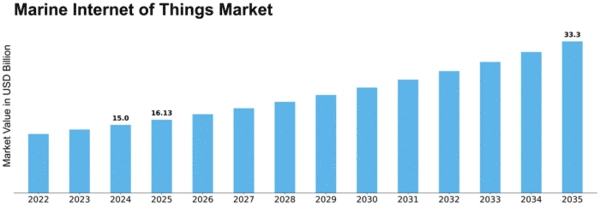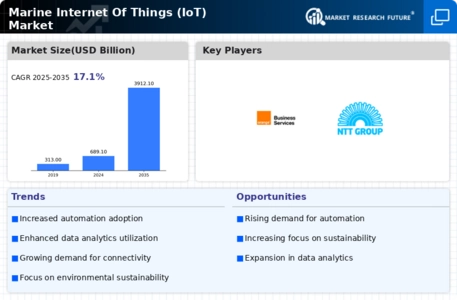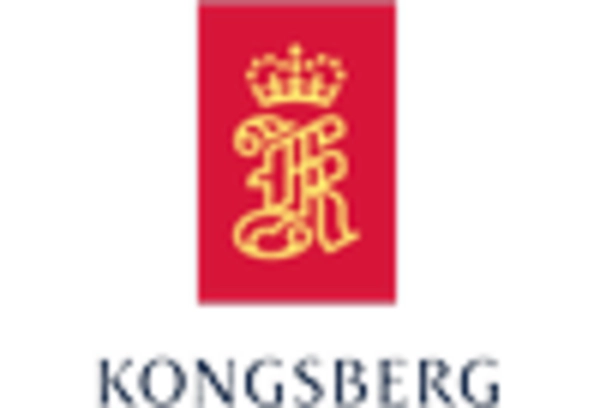Marine Internet Of Things Size
Marine Internet of Things Market Growth Projections and Opportunities
The growth of the marine Internet of Things (IoT) market and its significance in the maritime industry is largely influenced by several factors. Among key drivers of this market is the increasing digitalization and connectivity trends within the maritime sector. Marine IoT adoption allows integration of sensors, communication devices and data analytics for improved operational efficiency, safety and decision making. This answers to real-time data insights demand coming from smart navigation systems to condition monitoring ship components in the Marine IoT market.
One of crucial aspects influencing Marine IoT market is technological innovation leading to new possibilities: advances in sensor technologies, communication protocols and edge computing enable development of more advanced and reliable solutions for maritime IoT applications. The use of sensors on vessels, containers, and port facilities can result in real-time data collection enabling predictive maintenance; fuel optimization enhanced safety measures etc. Innovations made in satellite communications and connectivity solutions have gone a step further to extend the reach across remote areas or offshore settings so as to ensure unhindered flow of data that characterizes Marine IoT.
Marine IoT adoptions are driven by regulatory considerations alongside safety standards. International maritime authorities impose strict regulations regarding vessels’ safety, security, and environmental standards. Compliance with these rules forms one aspect that determines whether an organization can deploy Maritime-based IoT technologies into practice or not. Such requirements focus on vessel monitoring as well as emission control while at the same time enhancing its safety thus account for what shapes future direction of this technology.
Marine IoT growth can be fueled by environmental factors such as an emphasis on sustainability & fuel efficiency: Ship owners embrace various IoT solutions which monitor fuel consumption levels optimize emissions & conform to environmental laws.Inclusion of internet based applications in marine industry supports global commitment towards sustainable practices which are eco-friendly.The broader global focus on environmental stewardship is aligned with this by integrating IOT technologies into marine sector.
Operational cost optimization along with competitiveness among other economic factors dictate dynamics within the Marine IoT market. Fuel cost, operational efficiency and global competition are among the problems that maritime industry is currently facing. IoT solutions provide an affordable approach to monitor ship performance, coordinate logistics and improve overall business effectiveness. Marine IoT adoption’s economic advantages make it popular and appealing for investors in various segments of maritime supply chain.
Technological innovation for autonomous vessels as well as smart ports is another factor driving Marine IoT market growth. With the help of marine-based IoT technologies, remote monitoring plus navigation/ control of self-driven ships have become possible.Ports smarten-up through the application of Internet of Things to cargo handling, optimizing berthing schedules & overall port logistics. Such interconnections between smart port infrastructure and autonomous vessels demand for connected IOT systems which are capable to ensure efficient maritime operations thus sustainable.



















Leave a Comment